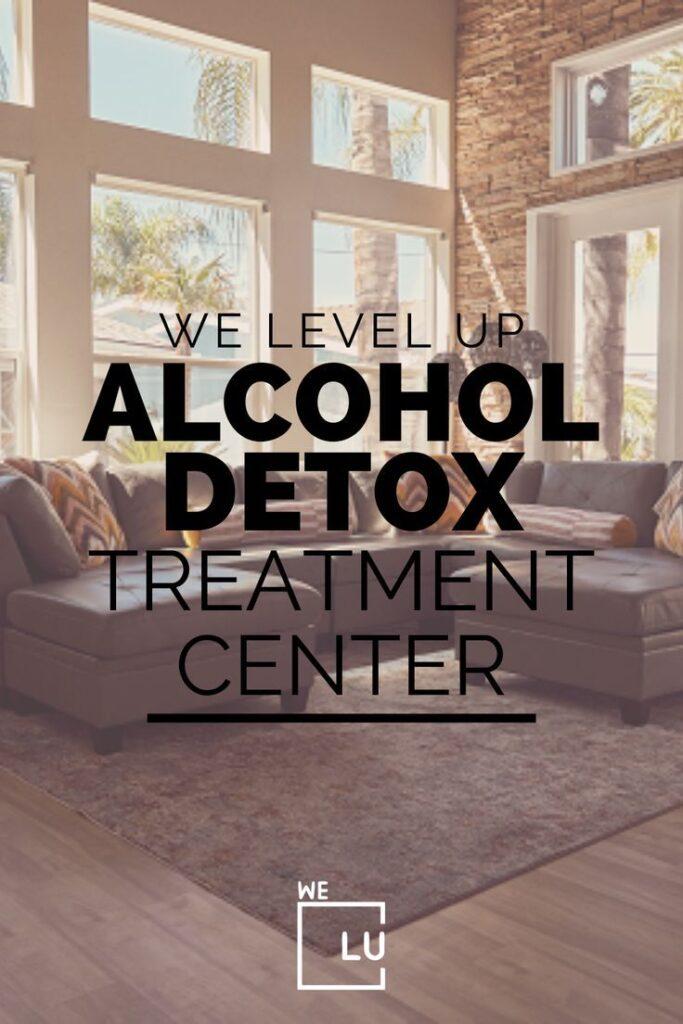Why Mixing Benadryl and Alcohol is Dangerous?
The combination of Benadryl and alcohol can be harmful. While Benadryl doesn’t affect the liver, it is a central nervous system (CNS) depressant. When Benadryl and alcohol are taken simultaneously, the impact on the central nervous system (brain and spinal cord) can lead to severe and heightened side effects. In some cases, this combination can be deadly. Drugs classified as depressants slow down the body’s nerve and brain function.
Both Benadryl and alcohol are classified as CNS depressants. First-generation antihistamines will cause drowsiness in just about everybody, and alcohol does that too, so if someone is taking alcohol and antihistamines, the chance of having a double dose of that drowsiness is very, very high. Depression of the central nervous system (CNS) can cause a slower rate of breathing, decreased heart rate, and loss of consciousness, leading to a coma in rare cases.
Can You Overdose on Benadryl and Alcohol?
Yes. The risk of overdose is heightened when combining Benadryl and alcohol, as both substances can have additive effects on the central nervous system.
Benadryl and alcohol overdose symptoms may include the following:
- Extreme drowsiness.
- Confusion and disorientation.
- Slowed breathing and respiratory depression.
- Irregular heartbeat and cardiovascular complications.
- Seizures and loss of consciousness.
If you suspect an overdose of Benadryl and alcohol or observe these symptoms in someone, it is crucial to seek immediate medical attention. Contact emergency services or visit the nearest emergency room for prompt evaluation and treatment.
Common Alcohol and Benadryl Interaction Side Effects
- Loss of consciousness.
- Some individuals are more prone than others to losing consciousness when sedated. In these individuals, mixing Benadryl and alcohol is more likely to cause a loss of consciousness. This can be hazardous due to the likelihood of falls and other accidents.
- Drowsiness.
- Benadryl can cause side effects, including drowsiness and sedation, and impair reaction speed and coordination. Mixing Benadryl and alcohol can intensify these side effects and impair an individual’s daily functioning.
- Complications in older adults.
- Aging slows the body’s ability to break down alcohol so that it may stay in the system of an older adult for longer than someone younger.
- Dehydration.
- Benadryl and alcohol are both known to dehydrate the body. Combining them can increase the risk of dehydration.
- Learning and memory impairment.
- Benadryl blocks the action of a neurotransmitter called acetylcholine. Acetylcholine is necessary for memory and learning, so blocking its action may temporarily impair these processes. Alcohol is also known to inhibit memory and learning temporarily. So, mixing Benadryl and alcohol may again have a more noticeable effect on learning and memory.
- Interactions with other types of medication.
- Benadryl may interact with other types of medication, which can increase the side effects. Taking these drugs with alcohol could also increase the risk of side effects.
- Examples of medications that may interact with Benadryl include:
- Sedatives.
- Diazepam (Valium).
- Antidepressants.
- Stomach ulcer medicine.
- Cough and cold medicine.
- Other antihistamines.
- Dementia.
- Excessive alcohol consumption is associated with a higher risk of dementia. It is possible that consuming large amounts of Benadryl and alcohol over long periods could be linked to an increased risk of dementia. However, longitudinal research would be required on people who consume high levels of Benadryl and alcohol to know whether this affects the risk of dementia.
- Sex.
- In general, females are more susceptible to alcohol-related harm. This is because their bodies typically contain less water for alcohol to mix with, meaning that the same amount of alcohol would be more concentrated in a female than in a male. Mixing Benadryl and alcohol may be particularly hazardous for females, as consuming smaller amounts of alcohol could trigger adverse interaction effects.
- Misuse.
- As Benadryl and alcohol both cause sedation and drowsiness, it may seem tempting to exploit this combination as a sleeping aid. However, this can also heighten other adverse side effects that interfere with sleep, such as dizziness and nausea.
Health Risks from Benadryl and Alcohol Interaction
The interaction between Benadryl and alcohol can pose several health risks. They can cause increased drowsiness and sedation, leading to extreme lethargy and impaired cognitive function. This can be harmful, especially when driving or operating machinery is involved.
Mixing Benadryl and alcohol can further contribute to dehydration, as both have diuretic properties. This can lead to electrolyte imbalances and potential complications. Furthermore, the combination may cause an increased heart rate and blood pressure, putting additional strain on the cardiovascular system.
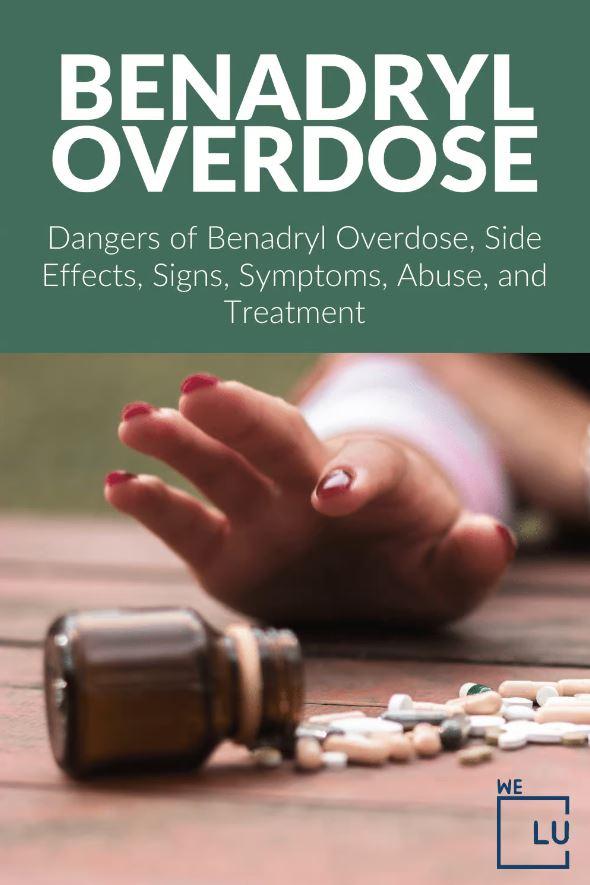
Skip To:
Learn More:
- Benadryl Overdose Treatments (Diphenhydramine Overdose)
- How To Clean Your System Of Alcohol in 24 Hours? How to Get Alcohol Out of System Fast? Tips & Strategies.
- Risks of Mixing Prescription Drugs With Alcohol
- AWS or Alcohol Withdrawal Timeline Symptoms, Seizures, Signs & Alcohol Withdrawal Detox Treatment
- Dangers of Muscle Relaxers and Alcohol Mix, Effects, Risks, and Interaction
- Can You Take Ibuprofen With Alcohol? Can You Mix Alcohol and Ibuprofen? Will Ibuprofen and Alcohol Kill You? Alcohol and Ibuprofen Dangers.
- Mixing Steroids and Alcohol Dangers. Can You Drink Alcohol on Steroids? Alcohol with Steroids Interactions.
- What Happens If You Mix Codeine and Alcohol?
- Risks in Mixing Antibiotics and Alcohol
- The Dangers Of Mixing Alcohol And Anxiety Meds
Mixing Alcohol and Benadryl Polydrug Abuse
Mixing alcohol and Benadryl is a form of polydrug abuse involving the simultaneous use or misuse of multiple substances. Polydrug abuse can have severe health risks and consequences. Polydrug abuse involving alcohol and Benadryl can also strain the liver. Both substances can have hepatotoxic effects, and combining them may increase the risk of liver damage or exacerbate existing liver conditions.
Can You Mix Benadryl and Alcohol? Infographic
Polydrug abuse when mixing Benadryl and alcohol can increase the likelihood of overdose. If you or someone you’re concerned with is engaging in polydrug abuse involving alcohol and Benadryl, it is crucial to seek help. Substance abuse treatment professionals, healthcare providers, or helplines can provide support, guidance, and resources for overcoming addiction and reducing associated health risks.
Embed the below “Can You Mix Alcohol and Benadryl?” Infographic to your Website. This Benadryl and alcohol infographic is provided by the We Level Up addiction treatment center team. To use the above infographics, you agree to link back and attribute its source and owner at https://welevelup.com/addiction/benadryl-and-alcohol/
Can You Mix Benadryl and Alcohol? Infographic image link: https://welevelup.com/wp-content/uploads/2023/06/Benadryl-and-Alcohol-3.jpg
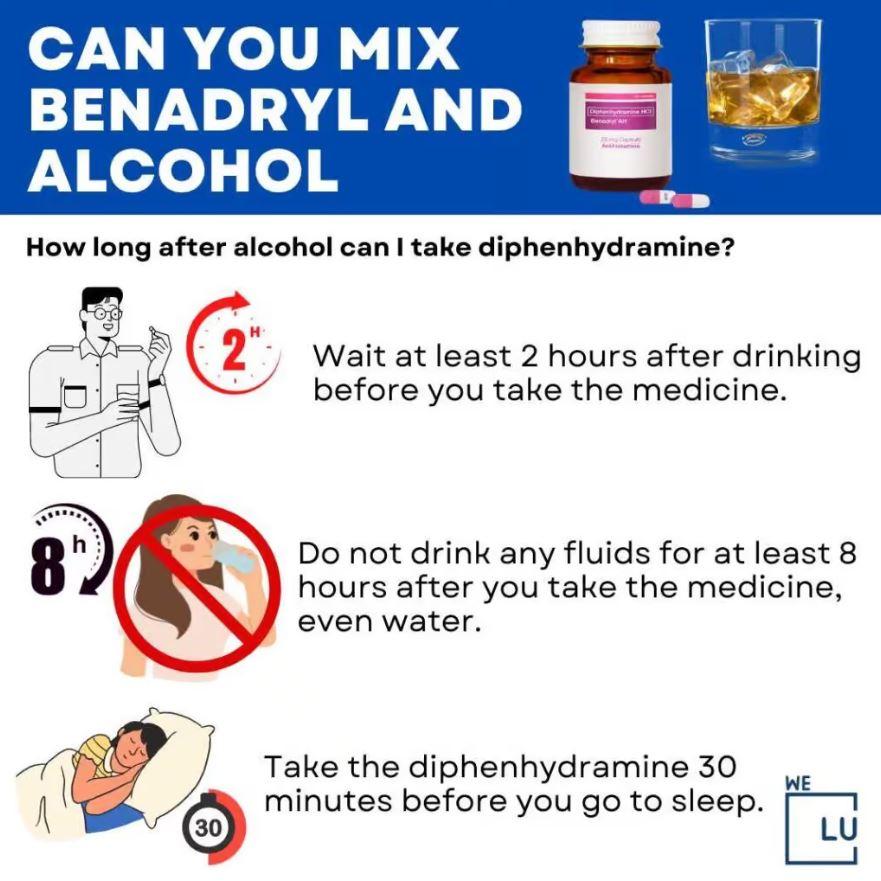
Benadryl and Alcohol Drug Facts
Normal Side Effects of Benadryl
Benadryl (diphenhydramine) is a brand name for an over-the-counter (OTC) medication classified as an antihistamine.
It’s used to help relieve symptoms of seasonal allergies such as hay fever, other allergies, the common cold, and itchy skin due to insect bites, hives, and other causes. People addicted to Benadryl often have simultaneous addictions to alcohol and other drugs. Therefore, asking for expert help in an inpatient drug rehab center might be an option that users can consider if they struggle with their substance abuse disorders.
The US Food and Drug Administration (FDA) warns that taking higher than recommended doses of the popular over-the-counter (OTC) allergy drug diphenhydramine (commonly known as Benadryl) may lead to serious heart problems, seizures, coma, or even death.
Typical and common side effects of Benadryl can include the following:
- Drowsiness.
- Dry mouth and throat.
- Blurred vision.
- Urinary retention.
- Dizziness or lightheadedness.
- Constipation.
- Impaired coordination.
Some individuals may experience mild effects, while others may have more pronounced symptoms. If you have concerns about the side effects of Benadryl or are experiencing any unexpected or severe symptoms, it is recommended to consult with a healthcare professional.
What Happens If You Mix Benadryl and Alcohol?
If you mix Benadryl (diphenhydramine) and alcohol, the effects can be amplified and potentially hazardous. Here’s what can happen if you combine the two:
- Increased sedation: Both Benadryl and alcohol are central nervous system depressants. Mixing them can intensify sedation and drowsiness, leading to extreme lethargy and impaired cognitive function.
- Impaired coordination: Both substances can affect motor skills and coordination individually. Combining them can further impair coordination, making it difficult to perform tasks that require balance and precision.
- Heightened dizziness and drowsiness: The combination of Benadryl and alcohol can cause an increased feeling of dizziness and can make you excessively sleepy or tired.
- Increased risk of accidents: Mixing Benadryl and alcohol can impair judgment, reaction time, and decision-making abilities. This raises the risk of accidents, falls, and injuries.
- Cardiovascular effects: Benadryl can increase heart rate, and alcohol can have similar effects. Combining them may increase heart rate, blood pressure, and cardiovascular strain.
Can you drink alcohol and take Benadryl? No. The effects may vary depending on the individual, their tolerance, and the quantities consumed. However, due to the potential risks and dangers, it is generally recommended to avoid mixing Benadryl and alcohol. If you have any concerns or questions about combining medications or substances, it’s best to consult with a healthcare professional or pharmacist for personalized advice.
Alcohol Use Facts & Resources
Polydrug abuse, such as Benadryl.and alcohol, can present unique challenges in terms of treatment and recovery. Addressing alcohol addiction and other substance dependencies may require comprehensive and tailored treatment approaches.
Download the below file from the Substance Abuse and Mental Health Services Administration (SAMHSA). This pdf has been publicly made available to raise awareness regarding alcohol use disorder.

Get Your Life Back
Find Hope & Recovery. Get Safe Comfortable Detox, Addiction Rehab & Dual Diagnosis High-Quality Care.
Hotline(844) 597-1011Benadryl and Alcohol Statistics
Polydrug abuse involving alcohol is relatively common. Many individuals who struggle with alcohol abuse or addiction may also misuse polydrugs by combining alcohol with other substances, including Benadryl.
95,000
Excessive alcohol use is linked to around 95,000 deaths in the United States each year, making it the country’s third leading preventable cause of death.
Source: CDC
7.6%
In 2019, only about 7.6% of individuals aged 12 or older with alcohol use disorder received any treatment.
Source: NSDUH
7.9 Million
7.9 million people aged 12 or older had a co-occurring substance use disorder involving both alcohol and drug abuse in the past year.
Source: NSDUH
Benadryl and Alcohol Death
Can I take Benadryl and drink alcohol? No. Mixing Benadryl (diphenhydramine) and alcohol can increase the risk of severe health complications, including death. Combining the two substances can have additive or synergistic effects, intensifying their depressant properties and impairing the central nervous system.
When alcohol and Benadryl are taken together excessively, it can lead to severe sedation, respiratory depression, and cardiovascular complications. Breathing may become shallow or slowed, oxygen levels in the body may decrease, and the heart may be affected, potentially resulting in a life-threatening situation.
Furthermore, combining alcohol and Benadryl can impair cognitive function, judgment, and coordination, increasing the risk of accidents, falls, or other hazardous situations that could result in fatal injuries.
Get Help. Get Better. Get Your Life Back.
Searching for Accredited Drug and Alcohol Rehab Centers Near You?
Even if you have failed previously and relapsed, or are in the middle of a difficult crisis, we stand ready to support you. Our trusted behavioral health specialists will not give up on you. When you feel ready or just want someone to speak to about therapy alternatives to change your life call us. Even if we cannot assist you, we will lead you to wherever you can get support. There is no obligation. Call our hotline today.
(844) 597-1011Can You Take Benadryl With Alcohol? Infographic
Can you take Benadryl and drink alcohol? No. The effects of mixing Benadryl and alcohol may vary based on the individual, their tolerance, and the quantities consumed. However, due to the potential risks and dangers, it is generally recommended to avoid mixing Benadryl and alcohol.
Embed “Can You Take Benadryl With Alcohol?” and “Alcohol & Benadryl” Infographics to your Website. This Benadryl and alcohol infographic is provided by the We Level Up addiction treatment center team. To use the above infographics, you agree to link back and attribute its source and owner at https://welevelup.com/addiction/benadryl-and-alcohol/
Can You Mix Benadryl and Alcohol? Infographic image link: https://welevelup.com/wp-content/uploads/2023/06/Benadryl-and-Alcohol-4.jpg
Alcohol and Benadryl Infographic image link: https://welevelup.com/wp-content/uploads/2023/06/Benadryl-and-Alcohol-1.jpg
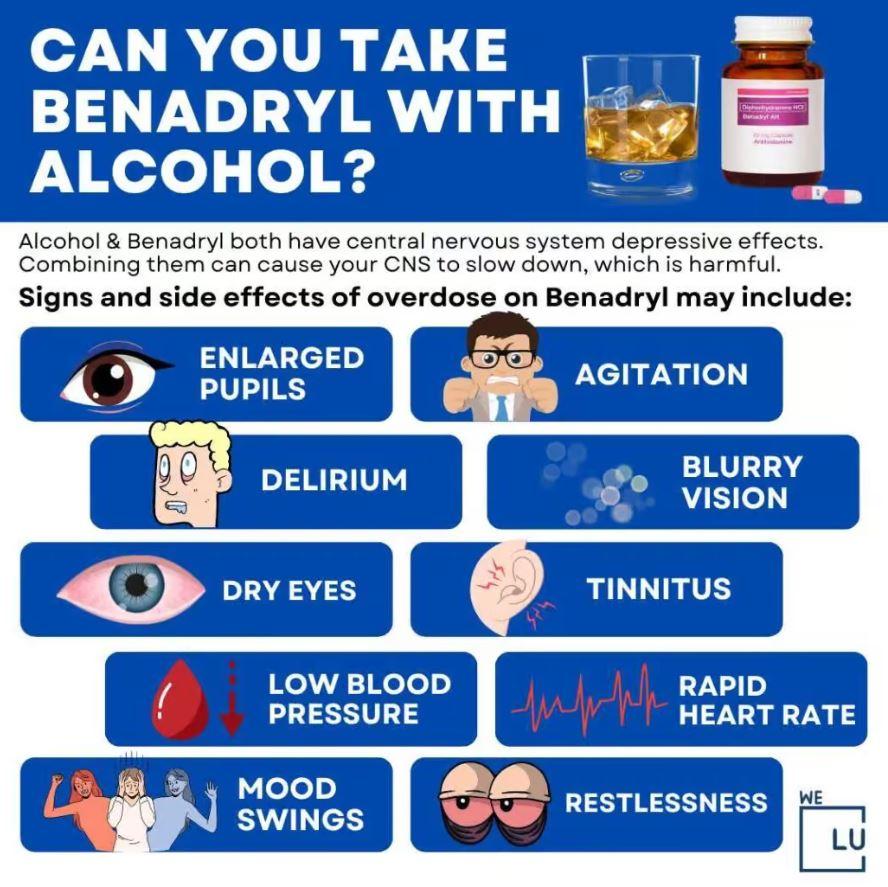
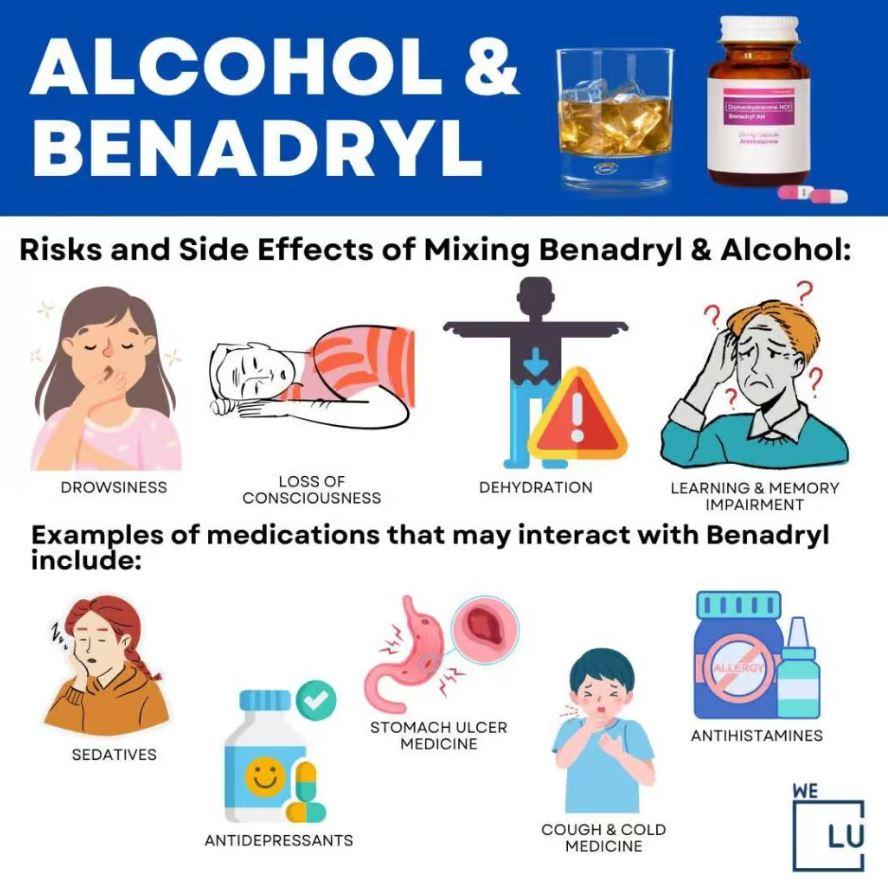
How Long After Alcohol Can I Take Benadryl?
Can you take Benadryl and alcohol? No. And no amount of drugs can be considered safe, whether 25 mg Benadryl and alcohol or lower. Antihistamines such as Benadryl are known to stay in your system for up to 48 hours. But this could be extended to older adults. It’s highly recommended to wait until the drugs wear off before drinking alcohol. The rate of elimination from the system varies from person to person. As such, you must consult your healthcare provider about when it’s safe to resume alcohol use after antihistamine medication. Benadryl and alcohol before bed are also hazardous.
Alcohol affects the effectiveness of antihistamines, such as Benadryl, especially if speaking about older adults’ medications. Even a tiny quantity of alcohol can affect the antihistamines effect, increasing the chances of making one sleepy. Moreover, alcohol is metabolized in the liver, and many drugs go via the same path. So, it can potentially interact with a whole host of medications.
First-class Facilities & Amenities
World-class High-Quality Addiction & Mental Health Rehabilitation Treatment
Rehab Centers TourRenowned Addiction Centers. Serene Private Facilities. Inpatient rehab programs vary.
Addiction Helpline(844) 597-1011Proven recovery success experience, backed by a Team w/ History of:
15+
Years of Unified Experience
100s
5-Star Reviews Across Our Centers
10K
Recovery Success Stories Across Our Network
- Low Patient to Therapist Ratio
- Onsite Medical Detox Center
- Comprehensive Dual-Diagnosis Treatment
- Complimentary Family & Alumni Programs
- Coaching, Recovery & Personal Development Events
Benadryl and Alcohol Polydrug Abuse Treatment
Alcohol is the most abused addictive substance in America, as more than 17 million people in the United States are considered to suffer from addiction to alcohol. At the same time, the Substance Abuse and Mental Health Service Administration (SAMHSA) publishes that over 1.5 million Americans are abusing a prescribed drug.
A pattern of using any two substances simultaneously over time can develop into polysubstance misuse. Polysubstance issues can set whether you use the substance to address health concerns, such as allergy symptoms and sleep disturbances, or recreationally.
A person may develop a substance use disorder. This is the diagnosis used to describe the behaviors broadly referred to as “addiction.” If one of the substances is alcohol, a person can develop an alcohol use disorder. If a person often or almost always uses the same substances, they may establish polysubstance use disorder.
Many options are available to help the person stop taking Benadryl and alcohol and avoid serious side effects from polysubstance abuse. Many Benadryl abusers respond well to residential rehab programs.
Get FREE addiction treatment insurance check – https://welevelup.com/rehab-insurance/
If you or a loved one is struggling with alcohol addiction or other substance use disorder(s), call for a FREE consultation 24/7 at (561) 678-0917
World-class, Accredited, 5-Star Reviewed, Effective Addiction & Mental Health Programs. Complete Behavioral Health Inpatient Rehab, Detox plus Co-occuring Disorders Therapy.
CALL(844) 597-1011End the Addiction Pain. End the Emotional Rollercoaster. Get Your Life Back. Start Drug, Alcohol & Dual Diagnosis Mental Health Treatment Now. Get Free No-obligation Guidance by Substance Abuse Specialists Who Understand Addiction & Mental Health Recovery & Know How to Help.
Top 5 Is Benadryl and Alcohol Safe? FAQs
-
Can you OD on Benadryl and alcohol?
Yes, it is possible to overdose on Benadryl and alcohol. Both substances can depress the central nervous system, and combining them can amplify their sedative effects. Taking excessive amounts of Benadryl can lead to symptoms such as extreme drowsiness, confusion, blurred vision, rapid heartbeat, and even seizures. Alcohol can exacerbate these symptoms and increase the risk of respiratory depression and other life-threatening complications. Overdosing on Benadryl and alcohol requires immediate medical attention, so if you or someone you know may have overdosed, it’s crucial to seek emergency medical assistance.
-
Can I take Benadryl and alcohol?
It is generally not recommended to take Benadryl and alcohol together due to potential interactions and increased sedative effects. Combining the two substances can intensify drowsiness, cause impaired coordination, and heighten the risk of accidents and injuries. It may also lead to heightened cardiovascular strain and worsen side effects such as dry mouth and blurred vision. If you have any concerns or questions about mixing medications or substances, it’s best to consult with a healthcare professional or pharmacist for personalized advice.
-
Can I mix Benadryl and alcohol?
It is not recommended to mix Benadryl and alcohol due to potential risks and interactions. Both substances can have sedative effects, and combining them can increase drowsiness and impair cognitive and motor function. This can lead to accidents, falls, and other injuries. Mixing Benadryl and alcohol can also strain the cardiovascular system and worsen side effects. It is crucial to prioritize your health and safety by avoiding the simultaneous use of Benadryl and alcohol. If you have any concerns or questions, it is best to consult with a healthcare professional for personalized advice.
-
Can you die from Benadryl and alcohol?
Combining Benadryl and alcohol can potentially have life-threatening consequences. Both substances can depress the central nervous system and respiratory function. Taking a high dose of Benadryl, especially in combination with alcohol, can lead to severe respiratory depression, loss of consciousness, and even death. Recognizing the potential risks and the danger of combining these substances. If you or someone you’re concerned with has ingested a dangerous amount of Benadryl and alcohol, it is imperative to seek immediate medical aid by calling emergency services.
-
What happens when you mix Benadryl and alcohol?
Mixing Benadryl and alcohol can result in increased sedation and impairment. Both substances have sedative effects on the central nervous system, and when combined, they can intensify drowsiness and cause extreme lethargy. This can lead to reduced coordination, impaired judgment, and an increased risk of accidents or falls. The combination may also cause an increased heart rate, blood pressure, and cardiovascular strain. Moreover, mixing Benadryl and alcohol can worsen side effects, including blurred vision, dry mouth, and constipation. It is generally advised to avoid combining these substances to ensure your safety and well-being.
Alcohol Poisoning Symptoms, Signs, Cures, Effects & What To Do?
Is it bad to mix Benadryl and alcohol? Yes. Benadryl itself does not cause alcohol poisoning. Alcohol poisoning typically occurs when a person consumes a large amount of alcohol quickly, leading to toxic levels of alcohol in the bloodstream.
However, combining Benadryl and alcohol can have potentially detrimental effects, as mentioned earlier. Both substances can cause sedation and impair cognitive and motor function. Together, they can intensify these effects, leading to extreme drowsiness, confusion, and impaired coordination.
If someone has consumed significant alcohol, Benadryl, or any other medication, monitoring their symptoms and seeking medical attention is crucial. Signs of alcohol poisoning and intoxication can include confusion, vomiting, seizures, slow or irregular breathing, and unconsciousness. If you suspect someone you’re concerned with may have alcohol poisoning, it’s crucial to contact emergency services or take them to the nearest emergency room immediately for proper medical care.
Alcohol Poisoning Symptoms, Signs, Cures, Effects & What To Do? Video Transcript.
Welcome to the We Level Up treatment center video series. In today’s video, we will discuss alcohol poisoning symptoms, signs, cures, effects & what to do.
Drinking much alcohol quickly can have dangerous and fatal side effects, such as alcohol poisoning. A coma or death may result from too much alcohol too quickly, affecting respiration, heart rate, body temperature, and gag reflex.
Severe alcohol intoxication necessitates immediate medical attention. If you believe someone may have alcohol poisoning, call 911 to obtain immediate emergency medical care.
When to visit a doctor for alcohol poisoning?
Not all of the warning signs or symptoms of alcohol poisoning must occur before you seek medical help. Patients with alcohol poisoning who are dozing off or who cannot be awakened risk dying.
Alcohol poisoning is an urgent situation.
If you have any suspicions, even if you don’t notice the classic symptoms or indicators of alcohol poisoning, you should get immediate medical help. What you need to do for alcohol poisoning is:
Dial your local emergency number or 911 right away. Never rely on someone recovering from alcohol poisoning to sleep.
Be prepared to share details. If you are aware, let medical staff or emergency workers know what kind, how much, and when the patient drank alcohol.
Never leave a person who is unconscious alone. Someone with alcohol poisoning may choke on their vomit and become unable to breathe because alcohol poisoning alters how the gag reflex functions. Don’t try to make the victim throw up while you wait for assistance; you risk making them choke.
Help someone who is throwing up. Make an effort to keep the person seated. Turn the person’s head to the side if they must lie down; this will help them from choking. To prevent unconsciousness, make an effort to keep the person awake.
Experience Transformative Recovery at We Level Up Treatment Centers.
See our authentic success stories. Get inspired. Get the help you deserve.
Start a New Life
Begin with a free call to an addiction & behavioral health treatment advisor. Learn more about our dual-diagnosis programs. The We Level Up Treatment Center Network delivers recovery programs that vary by each treatment facility. Call to learn more.
- Personalized Care
- Caring Accountable Staff
- World-class Amenities
- Licensed & Accredited
- Renowned w/ 100s 5-Star Reviews
We’ll Call You
Search We Level Up Benadryl and Alcohol Detox, Mental Health Topics & Resources
Sources
[1] Huynh DA, Abbas M, Dabaja A. Diphenhydramine Toxicity. [Updated 2023 Apr 29]. In: StatPearls [Internet]. Treasure Island (FL): StatPearls Publishing; 2023 Jan-. Available from: https://www.ncbi.nlm.nih.gov/books/NBK557578/
[2] Alcohol’s Effects on Health – National Institute on Alcohol Abuse and Alcoholism (NIAAA)
[3] Key Substance Use and Mental Health Indicators in the United States: Results from the 2020 National Survey on Drug Use and Health – Substance Abuse and Mental Health Administration (SAMHSA)
[4] Alcohol withdrawal – MedlinePlus Available from: https://medlineplus.gov/ency/article/000764.htm
[5] Sicari V, Zabbo CP. Diphenhydramine. [Updated 2022 Jul 11]. In: StatPearls [Internet]. Treasure Island (FL): StatPearls Publishing; 2023 Jan-. Available from: https://www.ncbi.nlm.nih.gov/books/NBK526010/
[6] Weathermon R, Crabb DW. Alcohol and medication interactions. Alcohol Res Health. 1999;23(1):40-54. PMID: 10890797; PMCID: PMC6761694.
[7] Alcohol-Medication Interactions – National Institute on Alcohol Abuse and Alcoholism (NIAAA)
[8] Diphenhydramine: MedlinePlus Drug Information Available from: https://medlineplus.gov/druginfo/meds/a682539.html
[9] FDA warns about serious problems with high doses of the allergy medicine diphenhydramine (Benadryl) – Food & Drug Administration (FDA)
[10] Notes from the Field: Antihistamine Positivity and Involvement in Drug Overdose Deaths — 44 Jurisdictions, United States, 2019–2020 – Centers for Disease Control and Prevention (CDC)
